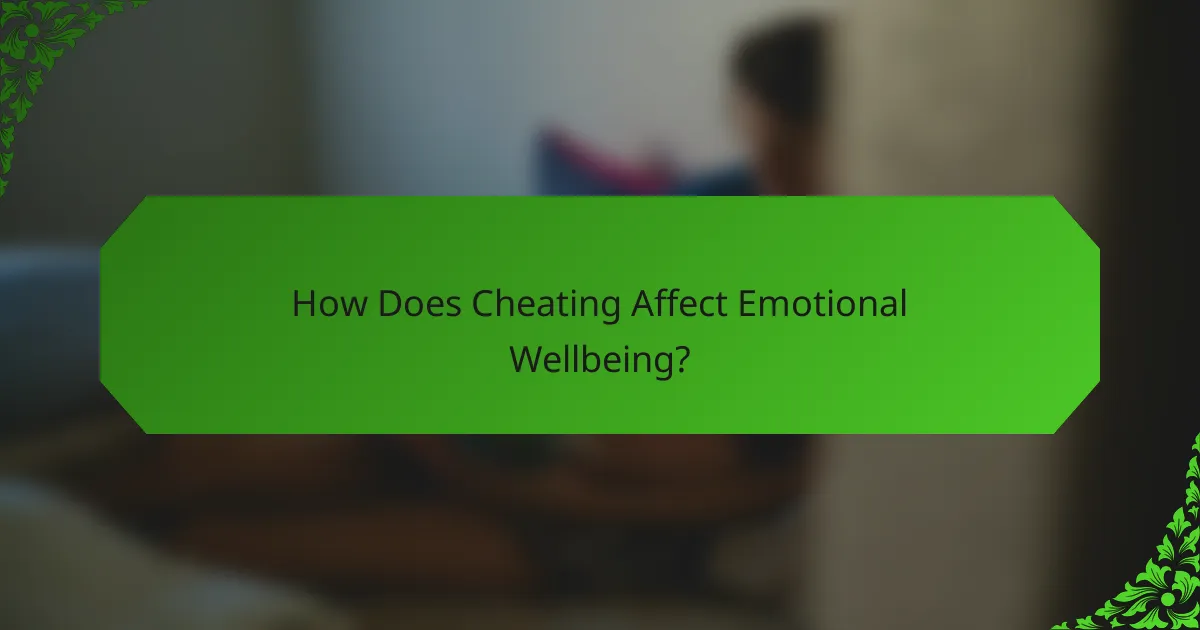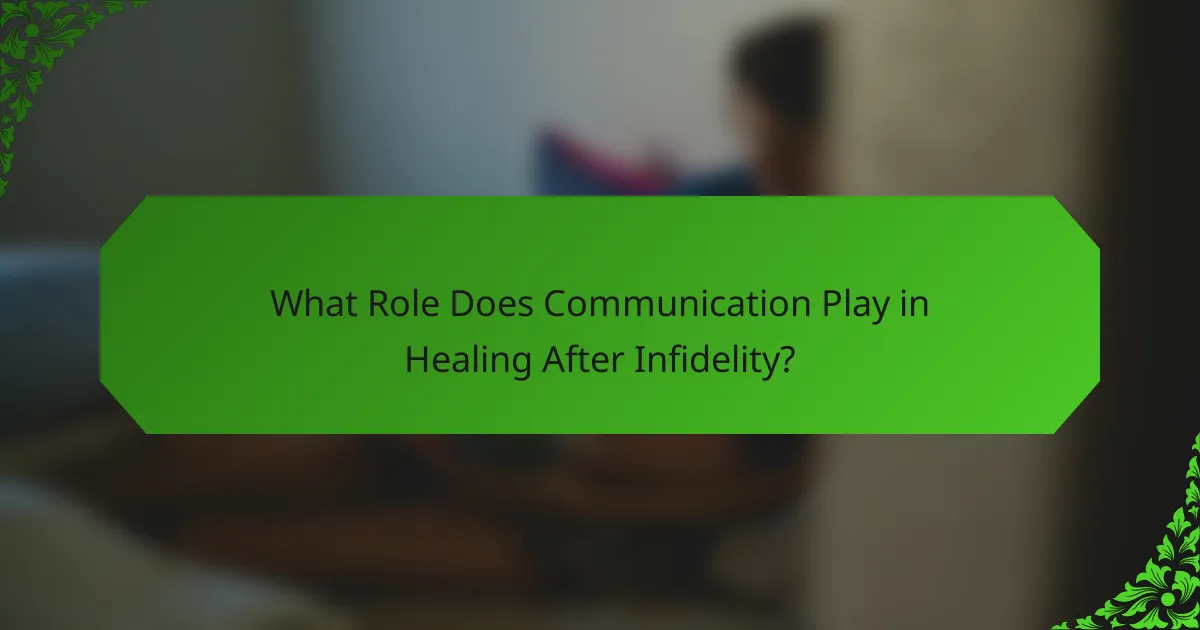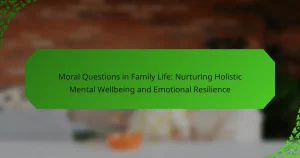Cheating can significantly impact emotional well-being and family dynamics, raising questions about its moral implications. This article explores the emotional fallout from infidelity, the strain on family relationships, and the importance of holistic healing. It emphasizes the role of communication in rebuilding trust and offers unique approaches like therapy and mindfulness practices to foster recovery and restore harmony. Understanding the complexities of cheating can facilitate empathy and promote healing within families.

How Does Cheating Affect Emotional Wellbeing?
Cheating negatively impacts emotional wellbeing, causing feelings of guilt, shame, and anxiety. These emotions can lead to depression and decreased self-esteem. Additionally, it disrupts trust in relationships, resulting in family dynamics that may become strained or fractured. Healing from these effects requires holistic approaches, including therapy and open communication.
What are the immediate emotional responses to infidelity?
The immediate emotional responses to infidelity often include shock, betrayal, and anger. Victims may experience feelings of inadequacy and sadness, impacting their self-esteem and trust in relationships. As a result, healing requires acknowledging these emotions and seeking support.
How can guilt and shame manifest in families?
Guilt and shame can manifest in families through conflict, emotional withdrawal, and communication breakdown. These feelings often lead to a toxic environment, affecting relationships and overall family dynamics. For example, a parent who feels guilty about infidelity may become distant, impacting their children’s emotional well-being. As a result, unresolved guilt and shame can perpetuate cycles of dysfunction within the family unit. Addressing these emotions through open dialogue and holistic healing practices can promote healthier interactions and restore familial bonds.
What are common signs of emotional distress in family members?
Common signs of emotional distress in family members include changes in mood, withdrawal from social interactions, and increased irritability. These signs often indicate underlying issues affecting family dynamics and emotional well-being. Other symptoms may include changes in sleep patterns, appetite fluctuations, and difficulty concentrating. Recognizing these signs early can facilitate holistic healing and improve family relationships.
What long-term emotional impacts can arise from cheating?
Cheating can lead to long-term emotional impacts such as trust issues, anxiety, and depression. These effects can persist in relationships, affecting future connections and overall mental health. Individuals may struggle with self-esteem and face challenges in establishing intimacy, as betrayal alters their perception of love and security. Healing requires time and often professional support to rebuild trust and emotional stability.

What Role Does Communication Play in Healing After Infidelity?
Communication is essential for healing after infidelity, as it fosters understanding and rebuilds trust. Open dialogue allows partners to express feelings, clarify intentions, and address underlying issues. This process can significantly reduce emotional distress and promote forgiveness, facilitating a holistic healing journey. Effective communication also encourages vulnerability, which is vital for restoring intimacy and connection. Ultimately, the role of communication in healing after infidelity cannot be overstated, as it lays the foundation for a renewed relationship.
How can open dialogue promote healing within families?
Open dialogue can significantly promote healing within families by fostering understanding and connection. It allows members to express feelings and perspectives, reducing misunderstandings and resentment. This communication can restore trust, a unique attribute essential for family dynamics, especially after emotional breaches like cheating. As a result, families can navigate the healing process more effectively, leading to improved emotional well-being and stronger relationships.
What communication strategies can help rebuild trust?
Open communication, active listening, and empathy are vital strategies to rebuild trust after infidelity. Establishing a safe space for dialogue encourages honesty and vulnerability. Consistent transparency about feelings and intentions fosters reassurance. Mutual respect and patience are essential as both partners navigate emotional complexities.
What are effective ways to express feelings after betrayal?
Effective ways to express feelings after betrayal include open communication, journaling, seeking support, and practicing self-compassion. These methods facilitate emotional processing and healing. Open communication with trusted individuals allows for the sharing of feelings and gaining perspective. Journaling helps articulate complex emotions, providing clarity. Seeking support from friends or professionals fosters connection and understanding. Practicing self-compassion encourages forgiveness and personal growth.

How Do Family Dynamics Shift After Cheating?
Cheating often leads to significant shifts in family dynamics, causing emotional turmoil and trust issues. Relationships may fracture as family members grapple with feelings of betrayal, anger, and confusion. Parents may find their roles challenged, affecting children who witness or are impacted by the discord. Open communication and counseling can facilitate healing, but rebuilding trust takes time and effort.
What changes occur in family roles and responsibilities?
Cheating can significantly alter family roles and responsibilities. Trust is often broken, leading to emotional distress and shifts in family dynamics. Parents may find themselves re-evaluating their roles, while children may experience instability. As a result, healing processes become essential to restore balance and redefine responsibilities within the family unit.
How can children be affected by parental infidelity?
Children can experience emotional distress, behavioral issues, and altered perceptions of relationships due to parental infidelity. The emotional impact often manifests as anxiety, depression, or anger, leading to challenges in family dynamics. Children may struggle with trust and intimacy in their future relationships, reflecting the unique attribute of parental influence on their emotional development. Holistic healing approaches, such as therapy and open communication, can help mitigate these effects, fostering resilience and healthier family connections.
What support systems can help children cope?
Support systems that can help children cope include family, friends, counselors, and community resources. These entities provide emotional support, guidance, and stability. Family dynamics play a crucial role; open communication fosters trust. Schools often offer counseling services, which can be vital for emotional healing. Engaging in group activities promotes social skills and resilience.

What Unique Healing Approaches Can Aid Families?
Unique healing approaches that can aid families include therapy, communication exercises, and mindfulness practices. These methods foster emotional resilience and strengthen family bonds. Family therapy addresses relationship dynamics, while open communication enhances understanding. Mindfulness practices, such as meditation, promote emotional regulation and reduce stress. Implementing these approaches can lead to holistic healing and improved family dynamics.
How can holistic practices support emotional recovery?
Holistic practices can significantly support emotional recovery by promoting healing through mind-body connection. Techniques such as meditation, yoga, and mindfulness enhance emotional awareness and resilience. These practices foster a supportive environment for individuals coping with the emotional fallout of infidelity, addressing feelings of betrayal and loss. As a result, holistic approaches can lead to improved emotional well-being and healthier family dynamics.
What role does therapy play in healing from infidelity?
Therapy plays a crucial role in healing from infidelity by providing a safe space for communication and emotional processing. It helps individuals and couples understand the underlying issues that led to the betrayal, fostering accountability and growth. Therapy can also improve trust and intimacy, essential elements for rebuilding relationships. Research shows that couples who engage in therapy after infidelity report higher satisfaction and a deeper emotional connection.
What types of therapy are most effective for families?
Family therapy, cognitive behavioral therapy, and emotionally focused therapy are among the most effective types for families. These approaches address emotional impacts and improve family dynamics. Family therapy focuses on communication and relationships. Cognitive behavioral therapy helps alter negative thought patterns. Emotionally focused therapy strengthens emotional bonds. Each method promotes holistic healing and resilience within family units.

What Rare Perspectives Exist on Cheating and Forgiveness?
Cheating is often viewed as a sin, impacting emotional well-being and family dynamics significantly. Rare perspectives emphasize the potential for holistic healing through understanding and forgiveness. Acknowledging the complexities behind infidelity can foster empathy and facilitate emotional recovery. For instance, exploring the motivations behind cheating may lead to deeper relational insights. Such perspectives encourage a shift from blame to healing, allowing families to rebuild trust and connection.
How do cultural attitudes towards infidelity differ?
Cultural attitudes towards infidelity vary significantly, influenced by religious beliefs, societal norms, and individual values. In some cultures, cheating is viewed as a severe moral failing, while others may see it as a more acceptable behavior under certain circumstances. For example, in collectivist cultures, the emphasis on family honour may lead to harsher judgments regarding infidelity, impacting family dynamics and emotional well-being. Conversely, more individualistic societies might prioritize personal happiness, leading to more lenient views on such actions. Understanding these differences is crucial for addressing the emotional impact and exploring holistic healing methods for those affected.
What are the uncommon paths to forgiveness in families?
Uncommon paths to forgiveness in families include open dialogue, shared rituals, and professional mediation. These methods foster understanding and healing beyond traditional approaches. Open dialogue allows family members to express feelings without judgment. Shared rituals, like family gatherings or storytelling, create bonds and shared experiences. Professional mediation can provide a neutral space for addressing deep-seated issues. Each path emphasizes emotional connection and collaborative healing, essential for restoring family dynamics after betrayal.

What Best Practices Can Families Adopt for Holistic Healing?
Families can adopt several best practices for holistic healing after experiencing the emotional impact of cheating. Prioritizing open communication fosters trust and understanding among family members. Engaging in family therapy can provide a safe space to address feelings and rebuild relationships. Practicing mindfulness and stress-reduction techniques, such as meditation or yoga, promotes emotional well-being. Establishing healthy boundaries and encouraging individual healing journeys are crucial for restoring harmony. Finally, nurturing supportive environments through shared activities strengthens familial bonds and aids in the healing process.
What daily habits can promote emotional wellbeing after betrayal?
Daily habits that promote emotional wellbeing after betrayal include practicing mindfulness, maintaining a gratitude journal, engaging in regular physical activity, and seeking social support. Mindfulness helps manage emotional responses, while gratitude fosters a positive outlook. Physical activity releases endorphins, boosting mood. Social connections provide validation and comfort, essential for healing. These habits support holistic healing by addressing emotional, mental, and physical aspects of wellbeing.
How can families create a supportive environment for healing?
Families can create a supportive environment for healing by fostering open communication and empathy. Establishing trust allows members to express their emotions without fear of judgment. Encouraging shared activities can strengthen bonds and promote collective healing. Providing resources, such as therapy or support groups, can also facilitate emotional recovery. Recognizing and validating each member’s feelings is crucial in rebuilding family dynamics after experiences of infidelity.
What common mistakes should families avoid during the healing process?
Families should avoid blaming each other, minimizing emotions, neglecting communication, rushing the healing process, and ignoring professional help. These mistakes can hinder recovery and exacerbate emotional pain. Open dialogue fosters understanding, while patience allows for genuine healing. Seeking therapy can provide essential guidance during this challenging time.




